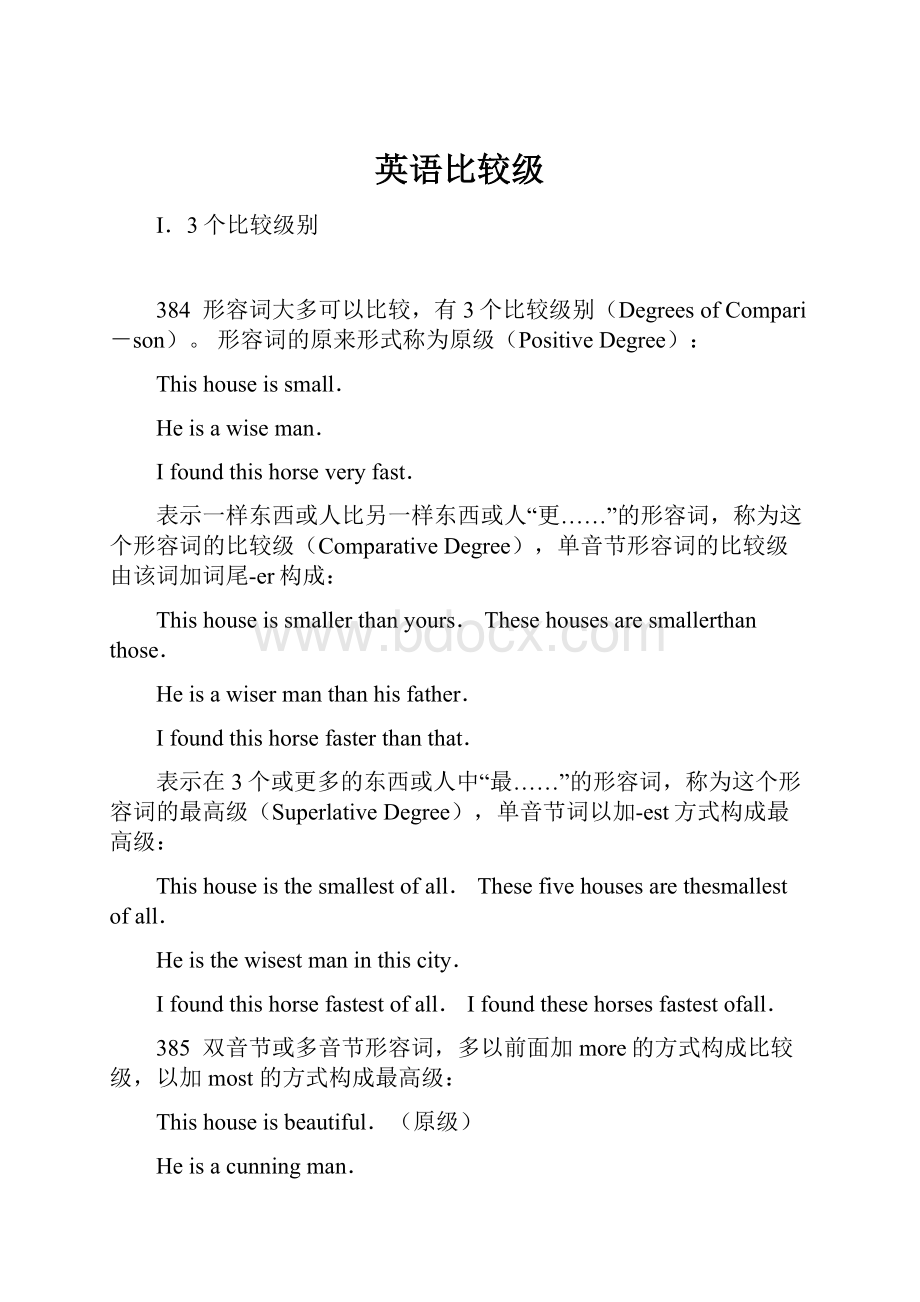英语比较级.docx
《英语比较级.docx》由会员分享,可在线阅读,更多相关《英语比较级.docx(39页珍藏版)》请在冰豆网上搜索。

英语比较级
Ⅰ.3个比较级别
384 形容词大多可以比较,有3个比较级别(DegreesofCompari-son)。
形容词的原来形式称为原级(PositiveDegree):
Thishouseissmall.
Heisawiseman.
Ifoundthishorseveryfast.
表示一样东西或人比另一样东西或人“更……”的形容词,称为这个形容词的比较级(ComparativeDegree),单音节形容词的比较级由该词加词尾-er构成:
Thishouseissmallerthanyours.Thesehousesaresmallerthanthose.
Heisawisermanthanhisfather.
Ifoundthishorsefasterthanthat.
表示在3个或更多的东西或人中“最……”的形容词,称为这个形容词的最高级(SuperlativeDegree),单音节词以加-est方式构成最高级:
Thishouseisthesmallestofall.Thesefivehousesarethesmallestofall.
Heisthewisestmaninthiscity.
Ifoundthishorsefastestofall.Ifoundthesehorsesfastestofall.
385 双音节或多音节形容词,多以前面加more的方式构成比较级,以加most的方式构成最高级:
Thishouseisbeautiful.(原级)
Heisacunningman.
Ifoundthehorseveryuseful.
Thishouseismorebeautiful(比较级)thanyours.
Heisamorecunningmanthanhisbrotner.
Ifoundthehorsemoreusefulthanthatone.
Thishouseisthemostbeautiful(最高级)ofall.
HeisthemostcunningmanIeversaw.
Ifoundthehorsethemostusefulofall.
386 还有一种比较方法,即往下比,表示“较不……”,“最不……”,这时可以分别在形容词前加less或least。
由less构成的比较级称为较低级(ComparativeofInferiority),以least构成的最高级称为最低级(SuperlativeofInferiority):
Thishouseislessbeautiful(不如……美)thanyours.
Heisalesscunningmanthanhisbrother.
Thishouseistheleastbeautiful(最不美)ofall.
HeistheleastcunningmanthatIeversaw.
387 副词也可以同样方式进行比较:
Johnranfast—fasterthanI—thefastestofall.
Hewritescarefully—morecarefullythanI—themostcare-fullyinclass.
Ⅱ.无法比较的形容词与副词
388 大多数品质形容词都可进行比较,但某些形容词是绝对的,无法比较的。
我们可以说nearlyperfect,quiteempty,almostdead,但不能说moreperfect,emptier,mostdead,也不能说Thisisrounderthanthat.下面是一些无法比较的形容词:
Absolute,chief,main,principal,complete,perfect,ideal,ex-cellent,supreme,unanimous,universal,whole,full,final,entire,ultimate,utter,uttermost,omnipotent,everlasting,eternal,fundamental,basic,primary,first,preliminary,u-nique,sole,all-seeing,all-knowing(还有其他由all-构成的合成词,以及形式上不是最高级而意义上都是最高级的形容词)
Homeless,harmless,fatherless,meaningless,illiterate,im-mortal,impossible,illegal,inevitable,invaluable,infinite,unendurable,unskilled,unripe(还有许多其他带有否定前缀或后缀的形容词,如由-less,ill-,in-,im-,un-等构成的形容词)
Contemporary,simultaneous,chaste,true,false,sufficient,e-qual,major,minor,dead,mortal,wooden,round,empty,void,sea-blue,etc.
Some,any,all,no,every(及其他指示形容词)
Monkey(例如monkeybusiness),child(asinchildcare),home(asinhomework)(和许多其他可用作形容词的名词)
不过,像monkeyish,homely和childish这样的正规形容词可以比较。
)
389 和某些形容词一样,某些副词也是不能比较的:
Now,yesterday,presently,eternally(时间)
Here,upward,down,away(地点)
Negatively,absolutely,universally,infinitely(及许多由不可比较形容词构成的副词)(方式)
390 有些似不能比的形容词,偶尔也有比较的形式,如fuller,pur-er,morecorrect,moreperfect,mostideal,mostcomplete,lessequal,lessempty,甚至一些优秀作家也这样用。
Ⅲ.比较级和最高级的构成法
A.形容词
391 单音节形容词通常都以加-er和-est的方式构成其比较级和最高级:
但在加词尾时要注意:
1)一般加-er,est:
tall taller tallest
bold bolder boldest
kind kinder kindest
great greater greatest
2)以-e结尾的词,只加-r和-st:
large larger largest
wise wiser wisest
fine finer finest
white whiter whitest
3)“辅音字母+元音字母+辅音字”(简称CVC)构成的词,
末尾字母要双写,再加-er和-est:
hot hotter hottest
thin thinner thinnest
flat flatter flattest
big bigger biggest
392 下面单音节形容词,用加more和most构成比较级和最高级比加-er和-est的时候多:
real just full
like right French
393 下面形容词既可以加词尾的方式构成比较级和最高级,也可加more,most构成(如truer,truest;moretrue,mosttrue),但用加词尾方式构成时更多一些:
drunk keen calm mild
glad cross plain pale
frank free huge vague
fond scarce prompt sound
394 下述双音节形容词以加词尾方式构成比较级及最高级:
1)以y结尾的词,先变y为i,再加词尾,如happy,happier,happiest:
happy angry dingy naughty
likely lucky misty stormy
lively kingly timely beastly
这种形容词偶尔也可以加more,most的方式构成比较级和最高级,如moremisty,mostmisty;morelucky,mostlucky。
但有些只能以加词尾方式构成比较级及最高级,如cleanly,kindly,lowly.
2)以-er结尾的词,如tenderer,tenderest:
tender bitter clever
(Eager,sober,slender也可加more,most方式构成)
3)以-ow结尾的词,如shallower,shallowest:
yellow narrow hollow shallow
4)以-le结尾的词,如simplef,simplest:
idle feeble subtle gentle
noble able supple
(Ample,humble,brittle,nimble,stable,agile,motile,senile,等,也可加more,most)
5)重音在第二音节的词,如polter[p+lit+r],politest[p+litist]。
polte sevére inténse obscúre
profóund remóte divne precse
moreormostantque,grotésque,chinése;moreormostafrid,awre,alóne,alke,aprt,contént及其他专门用作补语的形容词。
6)下述形容词,如crueler,cruelest:
dismal cruel common stupid distinct
pleasant quiet profound civil exact
(所有这些形容词也可以加more和most,只有cruel除外。
)
395 上面未提到的双音节词,通常多加more和most:
cautious morecautious mostcautious
foolish morefoolish mostfoolish
cheerful morecheerful mostcheerful
active moreactive mostactive
charming morecharming mostcharming
crooked morecrooked mostcrooked
docile moredocile mostdocile
constant moreconstant mostconstant
396 三音节或更多音节的词通常都加more和most:
beautiful morebeautiful mostbeautiful
affable moreaffable mostaffable
digestible moredigestible mostdigestible
malignant moremalignant mostmalignant
但加-er和-est的双音节形容词,在加上un-这样否定前缀
时,仍保持加-er,-est的方式:
untidy untidier untidiest
unlucky unluckier unluckiest
unholy unholier unholiest
unhappy unhappier unhappiest
impolite impoliter impolitest
ignoble ignobler ignoblest
397 现在分词和过去分词(起形容词作用的动词),不管有多少音节,都加more和most:
现在分词 过去分词
interesting interested
astonishing astonished
discouraging discouraged
tiring tired
charming charmed
shocking shocked
398 以-ful,-ed,-ing,-able及-id结尾的词,为了达到某种效果,可以加-er,-est,如cheerfulestwretchedest,cunningest,damnablest,candidest,但这是不规范的。
399 如果几个形容词修饰同一名词,它们可以采取一种方式,或全加-er,-est或全加more,most:
Thatisabolder,sordiderandhorriderway.
Heisthemeanest,falsest,butcleverestfellowIeverhaveknown.
Hemaybethemostproud,mostfree,mostenergeticandmostenterprisingmaninourcity.
在这种情况下,如果两种方式都用,可以前面加-er,-est,后面加more,most:
Heisthemerriest,cleverest,mostintelligent,mostcoura-geousofmyfriends.
有时只在第一个形容词前加more,most,后面形容词前都不再加什么:
Hemaybethemostproud,free,andenergetic(=mostproud,mostfreeandmostenergetic)maninthecity.
Theroadismorerugged,muddyandhillythananyothers.
400 总之,上述规律一般是有效的,但并不是十分严格的。
它们可能受音韵、个人喜好及其他因素的影响。
401 还有一些形容词有不规则的比较形式:
good(well) better best
bad(ill,evil) worse worst
many(much) more most
little less(lesser) least
old older(elder) oldest(eldest)
late later(latter) latest(last)
far farther(further) farthest(furthest)
near nearer nearest(next)
402 下面主要表示空间的词,只在后面加-er,及加-most,原级词除hind外都是副词。
但这种比较级不能和than引起的从句一起用。
比较级和最高级都只用在名词前作限制性形容词。
hind hinder hindmost
fore former(过去 foremost(最前的,最早
的,或前者) 的,最重要的)
in inner inmost(orinnermost)
out outer(更外 outmost(oroutermost)(离
的,离中心 里面或中心最远的)
较远的)
out utter(极为) utmost(oruttermost)(最
大的)
up upper upmost(oruppermost)
下面的词也表示空间,但不加-est,而只在后面加most,如
middle,middlemost;top,topmost;end,endmost:
top,bottom,front,back,head,left,right,centre,deep,north,northern
403 某些以-or结尾的词没有原级及最高级。
其中五个已失去比较的意义
(1);有九个和to引起的短语一起用,而不和than引起的从句一起用
(2):
1)interior,exterior,ulterior,minor,major
Theinteriorpartisofmajorimportance.
2)senior,junior,superior,inferior,anterior,posterior,prior,previous,subsequent
Johnis5yearsseniortoRichard,butinferiortohiminin-telligence.
Prior(orPrevious)to(=before)theirmarriage,theydidnotknoweachother.
404 合成形容词大多在前面加more及most:
foolhardy morefoolhardy mostfoolhardy
short-sighted moreshort-sighted mostshort-sighted
home-sick morehom